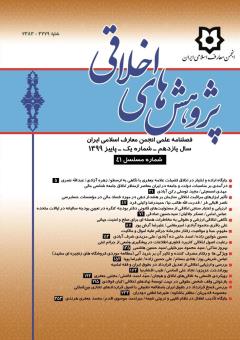رویکردی فلسفی به تلاقیهای اخلاق و هیجان
محورهای موضوعی : Ethics and Islamic Educationسید احمد فاضلی 1 , مجتبی جعفری 2
1 - دانشگاه قم
2 - دانشگاه قم
کلید واژه: حیث التفاتی, ارزیابی, انگیزش, منش اخلاقی, فضیلت.,
چکیده مقاله :
سبب توجه اهل فلسفه به هیجانات آن است که معرفت و شادکامی و اخلاق که از دیرباز دلمشغولی اصلی فلسفه بود تلاقیهای بسیاری با هیجانات دارد. از این رو، فیلسوفان کوشیدهاند تا نشان دهند ارزش و جایگاه هیجانات در کسب معرفت و تحصیل شادکامی و زندگی اخلاقی چیست. فیلسوفان در مقایسه با عالمان بیشتر بر تحلیلهای انتزاعی درباب هیجانات متمرکزاند. کاوش در سرشت هیجان به مسائل فلسفی چندی میانجامد از جمله: هیجان و دیگر عواطف آدمی چه تمایزاتی دارند؟ آیا هیجان ارزیابانه است یعنی باید آن را از جنس حکم و داوری دانست یا از سنخ ادراکات یا چیز دیگری به شمار آورد؟ شأن معرفتی هیجانات و نسبت آن با احکام و داوریهای ارزشی چیست؟ چه رابطهای میان انگیزش و هیجان است؟ و سرانجام، جایگاه هیجان در اخلاق کجاست و چه تأثیری بر شکلگیری فضیلت و منش اخلاقی دارد؟.
Emotions are concerned about by philosophers because knowledge, happiness, and ethics that have been a longstanding concern of philosophy, have some intersects with emotions. They have, therefore, tried to show the value and place of emotions in the acquisition of knowledge of happiness and moral life. Their focus, in comparison with scientists, is more on an abstract analysis of emotions. Exploring the nature of emotion leads to several philosophical issues, such as: What are the differences between emotions? Is it evaluating, that is, whether it has to be taken as evaluative judgments, or perceptions, or something else? What is the epistemological status of emotions and their relation to evaluative judgments? What is the relationship between motivation and emotion? And finally, what its role in the moral life, and what effect does it have on the development of virtues and moral character?.
ارسطو (1385)، اخلاق نیکوماخوس، محمدحسن لطفی، تهران، طرح نو.
زگزبسکی، لیندا (1396)، فضایل ذهن، امیرحسین خداپرست، تهران، کرگدن.
هیوم، دیوید (1397)، رسالهای دربارة طبیعت آدمی: کتاب دوم و سوم، جلال پیکانی، تهران، ققنوس.
Annas, J. (2011). Intelligent Virtue. Oxford: Oxford University Press.
Ayer, A. J. (2001). Language, Truth and Logic. New York: Penguin Books.
Battaly, H. (2014). Virtue. Cambridge: Polity Press
Brentano, F. (1889/2009). The Origin of Our Knowledge of Right and Wrong. London: Routledge.
Charland, L. (2005). The heat of emotion: valence and the demarcation problem. J Consciousness Stud, 12 : 82–102.
Damasio, Antonio (1994/2005). Descartes’ Error: Emotion, Reason, and the Human Brain. New York: Penguin Books.
Deonna, J., Rodogno, R. & Teroni, F. (2011). In Defense of Shame : The Faces of an Emotion. Oxford : Oxford University Press.
Deonna, J. & Teroni, F. (2012). The Emotions: A Philosophical Introduction. New York : Routledge.
Döring, S. A. (2003). Explaining action by emotion. Philos Q, 53 : 214–230.
Döring, S. A. (2014). Why recalcitrant emotions are not irrational. In Todd, C. & Roeser, S. (éd.) Emotion and Value. Oxford : Oxford University Press.
Elster, J. (1999). Alchemies of the Mind : Rationality and the Emotions. New York : University Press.
Goldie, P. (2000). The Emotions: A Philosophical Exploration. Oxford : Oxford University Press.
Griffiths, P. E. (2013). Current Emotion Research in Philosophy. Emotion Review, Vol. 5, No. 2, 215–222.
Haidt, J. (2003) The moral emotions. In: Davidson JR, Scherer KR, Goldsmith HH (eds) Handbook of affective sciences. Oxford: Oxford University Press.
Helm, B. (2010). Emotions and motivation: reconsidering neo-Jamesian accounts. In Goldie, P. (éd.) Oxford Handbook of Philosophy of Emotion. Oxford : Oxford University Press.
Hume D.(1739–1741/2007) In: Norton DF, Norton MJ, eds. A Treatise of Human Nature. Vol 1. Oxford: Oxford University Press.
Kenny, A. (1963). Action, Emotion and Will. London : Routledge and Kegan Paul.
Nussbaum, M. C. (2004). Emotions as judgments of value and importance. In Solomon, R. C. (éd.) Thinking About Feeling: Contemporary Philosophers on Emotions (pp. 183-199). New York : Oxford University Press.
Prinz, J. (2004). Gut Reactions : A Perceptual Theory of Emotions. New York : Oxford University Press.
Prinz, J. (2007). The Emotional Construction of Morals. New York : Oxford University Press.
Roberts, R. C. (2003). Emotions: An Essay in Aid of Moral Psychology. Cambridge : Cambridge University Press.
Roberts, R. C. (2013). Emotions in the Moral Life. New York : Cambridge University Press.
de Sousa, R. (1987). The Rationality of Emotion. Cambridge : MIT Press.
Tappolet, C. (2010). Emotions, action, and motivation : the case of fear. In Goldie, P. (éd.) Oxford Handbook of Philosophy of Emotion. Oxford : Oxford University Press.
Teroni, F. (2017). In pursuit of emotional modes: The philosophy of emotion after James. Dans A. Cohen & B. Stern (éd.), Thinking about the emotions: A philosophical history. Oxford: Oxford University Press.


